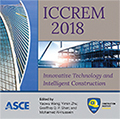International Conference on Construction and Real Estate Management 2018
Customer Requirement Analysis of Engineering Project Safety Management Intelligent System
Publication: ICCREM 2018: Innovative Technology and Intelligent Construction
ABSTRACT
Customer demand analysis is the basis of the development of the intelligent system of project safety management. The customers’ requirements are only understood more accurately in the process of product design, so that designers can acquire the goal and direction of products development, providing reliable decision-making basis. This paper considers the features of uncertainty and fuzziness of customers’ preference, supposes an analysis method of customers’ dynamic requirements in product life-cycle management. By utilizing genetic algorithms and fuzzy cognitive map, the feedback mechanism of requirements between products and customers are established. A case study of engineering project safety intelligent management system development is provided to illustrate the feasibility and effectiveness of the requirement analysis method and feedback mechanism.
Get full access to this article
View all available purchase options and get full access to this chapter.
REFERENCES
Chong, Y.T. and Chen, C.H. (2010). “Management and forecast of dynamic customer needs: An artificial immune and neural system approach.” Advanced Engineering Informatics, 24(1), 96-106.
Coban, O. and Secme, G. (2005). “Prediction of socio-economical consequences of privatization at the firm level with fuzzy cognitive mapping.”Information. Science, 169(1-2), 131-154.
Cui, J., Qi, G.N. and Ji, Y.J. (2008). “Customer requirement based on customer architecture hierarchy and BP in product lifecycle management system.” Journal of Zhejiang University, 42(3), 528-533. (in Chinese).
Desnet, P. (2012) “Faces of product pleasure: 25 positive emotions in human-product interactions.” International Journal of Design, 6(2), 1-29.
Faghihi, V., Reinschmidt, K.F. and Kang, J.H. (2014). “Construction scheduling using Genetic Algorithm based on Building Information Model.” Expert Systems With Applications, 41(16), 7565-7578.
Ge, J.H., Xu, J.Y., Wang, Y.P. and Wei, F. (2010). “Research on customer requirements expansion based on TRIZ and Grey Theory.” Applied Mechanics and Materials, 979(29), 55-63. (in Chinese).
Hashim, A.M. and Dawal, S.Z.M. (2012). “Kano model and QFD integration approach for ergonomic design improvement.”Procedia - Social and Behavioral Sciences, 57(57), 22-32.
Hosny, M.I. (2011). “A survey of genetic algorithms for the university timetabling problem.”International Association of Computer Science and Information Technology, (2011), 13.
Kannappan, A., Tamilarasi, A. and Papageorgiou, E.I. (2010). “Analyzing the performance of fuzzy cognitive maps with non-linear hebbian learning algorithm in predicting autistic disorder.” Expert Systems With Applications, 38(3), 1282-1292.
Kok, K. (2009). “The potential of Fuzzy Cognitive Maps for semi-quantitative scenario development, with an example from Brazil.” Global Environmental Change, 19(1), 122-133.
Kosko, B. (1986). “Fuzzy cognitive maps.” International Journal of Man-Machine Studies, 24(1), 65-75.
Llinares, C. and Page, A.F. (2011). “Kano’s model in Kansei engineering to evaluate subjective real estate consumer preferences.” International Journal of Industrial Ergonomics, 41(3), 233-246.
Lopez-Mesa, B. and Thompson, G. (2006). “On the significance of cognitive style and the selection of appropriate design methods.” Journal of Engineering Design, 17(4), 371-386.
Xu, Q., Jiao, R.J., Yang, X., Helander, M. and Khalid, H.M. (2009). “An analytical Kano model for customer need analysis.” Design Studies, 30(1), 87-110.
Zhang, L. and Wang, N. (2013). “A modified DNA genetic algorithm for parameter estimation of the 2 Chlorophenol oxidation in supercritical water.” Applied Mathematical Modelling, 37(3), 178-191. (in Chinese).
Zhao, W.Y., Zhang, H.G., He, Z. and Tan, R.H. (2011). “Rough number—customer requirements analytical method.” Computer Integrated Manufacturing Systems, 17(11), 2493-2501. (in Chinese).
Information & Authors
Information
Published In
ICCREM 2018: Innovative Technology and Intelligent Construction
Pages: 252 - 262
Editors: Yaowu Wang, Professor, Harbin Institute of Technology, Yimin Zhu, Professor, Louisiana State University, Geoffrey Q. P. Shen, Professor, Hong Kong Polytechnic University, and Mohamed Al-Hussein, Professor, University of Alberta
ISBN (Online): 978-0-7844-8172-1
Copyright
© 2018 American Society of Civil Engineers.
History
Published online: Aug 8, 2018
Published in print: Aug 8, 2018
Authors
Metrics & Citations
Metrics
Citations
Download citation
If you have the appropriate software installed, you can download article citation data to the citation manager of your choice. Simply select your manager software from the list below and click Download.
